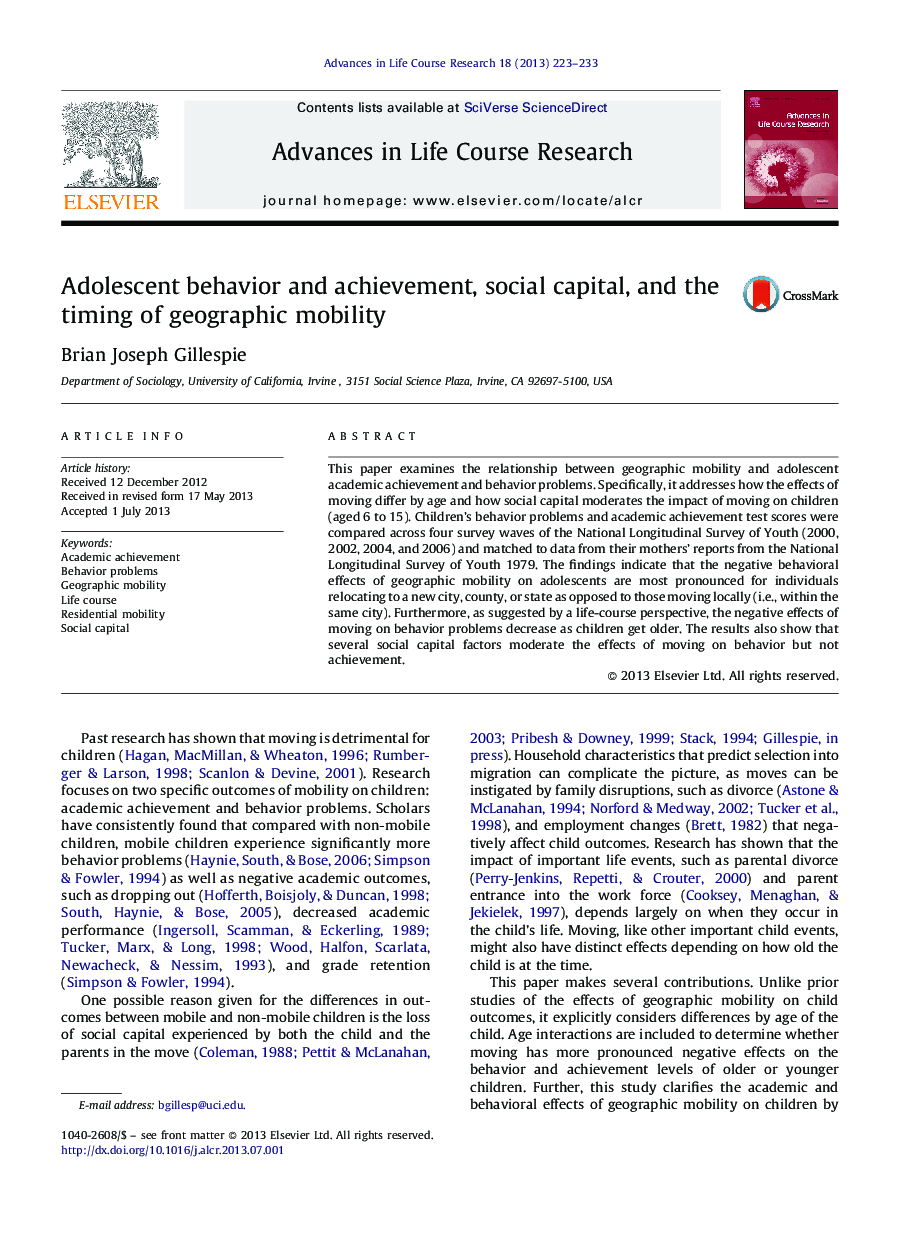| کد مقاله | کد نشریه | سال انتشار | مقاله انگلیسی | نسخه تمام متن |
|---|---|---|---|---|
| 10296813 | 534387 | 2013 | 11 صفحه PDF | دانلود رایگان |
عنوان انگلیسی مقاله ISI
Adolescent behavior and achievement, social capital, and the timing of geographic mobility
ترجمه فارسی عنوان
رفتار و موفقیت نوجوانان، سرمایه اجتماعی و زمان تحرک جغرافیایی
دانلود مقاله + سفارش ترجمه
دانلود مقاله ISI انگلیسی
رایگان برای ایرانیان
کلمات کلیدی
دستاوردهای علمی، مشکلات رفتاری، جابجایی جغرافیایی، دوره زندگی، تحرک مسکونی، سرمایه اجتماعی،
ترجمه چکیده
این مقاله رابطه بین تحرک جغرافیایی و پیشرفت تحصیلی نوجوانان و مشکلات رفتاری را مورد بررسی قرار می دهد. به طور خاص، آن را به چگونه اثرات حرکت بر اساس سن متفاوت است و چگونه سرمایه اجتماعی را کاهش می دهد تاثیر حرکت در کودکان (6 تا 15 سال). مشکلات رفتاری کودکان و نمرات آزمون پیشرفت تحصیلی در چهار امتحان بررسی طولی ملی جوانان (2000، 2002، 2004، 2006) و با داده های گزارش های مادرانشان از نظر سنجی طولی جوانان سال 1979 مقایسه شد. یافته ها نشان می دهد که اثرات رفتاری منفی از تحرک جغرافیایی در نوجوانان بیشتر برای افرادی که به یک شهر، شهرستان یا ایالت جدید نقل مکان می کنند نسبت به کسانی که به طور محلی حرکت می کنند (یعنی در داخل یک شهر) بیشتر است. علاوه بر این، با توجه به دیدگاه دوره زندگی، اثرات منفی حرکت به سمت مشکلات رفتاری با افزایش سن فرزندان کاهش می یابد. نتایج همچنین نشان می دهد که چندین عامل سرمایه اجتماعی، تأثیر حرکت بر رفتار، اما نه دستیابی به موفقیت را کاهش می دهند.
موضوعات مرتبط
مهندسی و علوم پایه
ریاضیات
آمار و احتمال
چکیده انگلیسی
This paper examines the relationship between geographic mobility and adolescent academic achievement and behavior problems. Specifically, it addresses how the effects of moving differ by age and how social capital moderates the impact of moving on children (aged 6 to 15). Children's behavior problems and academic achievement test scores were compared across four survey waves of the National Longitudinal Survey of Youth (2000, 2002, 2004, and 2006) and matched to data from their mothers' reports from the National Longitudinal Survey of Youth 1979. The findings indicate that the negative behavioral effects of geographic mobility on adolescents are most pronounced for individuals relocating to a new city, county, or state as opposed to those moving locally (i.e., within the same city). Furthermore, as suggested by a life-course perspective, the negative effects of moving on behavior problems decrease as children get older. The results also show that several social capital factors moderate the effects of moving on behavior but not achievement.
ناشر
Database: Elsevier - ScienceDirect (ساینس دایرکت)
Journal: Advances in Life Course Research - Volume 18, Issue 3, September 2013, Pages 223-233
Journal: Advances in Life Course Research - Volume 18, Issue 3, September 2013, Pages 223-233
نویسندگان
Brian Joseph Gillespie,
